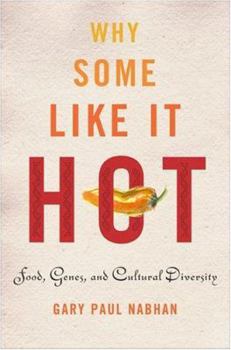Why Some Like It Hot: Food, Genes, and Cultural Diversity
Select Format
Select Condition 
Book Overview
Do your ears burn whenever you eat hot chile peppers? Does your face immediately flush when you drink alcohol? Does your stomach groan if you are exposed to raw milk or green fava beans? If so, you... This description may be from another edition of this product.
Format:Hardcover
Language:English
ISBN:1559634669
ISBN13:9781559634663
Release Date:August 2004
Publisher:Island Press
Length:244 Pages
Weight:0.90 lbs.
Dimensions:0.9" x 6.0" x 9.0"
Related Subjects
Anatomy Anatomy & Physiology Anthropology Biological Sciences Biology & Life Sciences Cultural Customs & Traditions Ecology Evolution Genetics Health Health, Fitness & Dieting Health, Fitness & Dieting Nutrition Politics & Social Sciences Science Science & Math Science & Scientists Science & Technology Social Science Social SciencesCustomer Reviews
4 ratings
Great book! But yes, we need more
Published by Thriftbooks.com User , 14 years ago
I thought this book was great! It really fills in some gaps and makes a lot of sense in understanding the picture of how food, genetics, history, etc. work together; and how so many of the discusions of "what to eat" are impossible to answer in general. This book reorganized my thinking and has given me a new angle on the complexity of our food relationships. From a practical standpoint I'd love to know more, to be able to assess what my boring European ancestry means for me personally... But it's much easier to suggest solutions for problems (such as the issues of the Pima and Hawaiians) than figure out recommendations for ethnic groups without specific problems in common. But I hope they (the various newly named cross-discipline fields) take these concepts further and expand on it.
Or not hot...
Published by Thriftbooks.com User , 16 years ago
This book lies at the intersection of several fields, including but not limited to nutrition, history, evolutionary biology, agriculture, biochemistry and genetics. The author's premise can be stated as follow: the members of any ethnic group have evolved to adapt to the edible materials present in their environment to maximize their survival chances. At first, this premise does not seem like much, as the author admits early in the book. But he proceeds to examine several vary different ethnic cuisines, and the environment and culture they arose in, and then shows us how different ethnic groups can require vastly different diets in order to lead healthy and long lives. The ramifications then become huge. For instance, the Atkins diet and Mediterranean-based diets are really not that appropriate for all types of people; but only for those of specific ethnic backgrounds. Some of science cited in this book is quite important. First, the author explains how the use of spices is related to food preservation. Specifically, food like meat spoils quicker in tropical areas than temperate areas. Many spices kill microbes that spoil meats, hence early humans in tropical areas learned by trial and error to add spices to their foods to preserve them longer. Second, the author demonstrates the links between diet and environment. For example, diet of fava beans is useless vis-a-vis other types of beans in arid environments. But in a climate full of malaria-carrying mosquitoes, ingesting fava beans changes the blood chemistry to reduce the likelihood of a malarial infection. The book is written as a combination of personal narrative and scientific text. The author provides examples from his own life of how diet and environment interact with a person's genetic makeup to affect health. The amount of science in the text probably requires a college education to understand, though not a medical degree. The text is smooth-flowing and easy to follow, and overall quite interesting.
Why Some Like it Hot: Food, Genes, and Cultrual Diversity
Published by Thriftbooks.com User , 18 years ago
Excellent reading! I found the information intreguing and exciting but too short. Need more of this type of information. We have heard too much of the life style side of health living and not enough about the interaction of genes on what we eat and how this may affect our life and health.
Connections between human health & what is eaten and drunk
Published by Thriftbooks.com User , 19 years ago
Why Some Like It Hot: Food, Genes, And Cultural Diversity by ethnobiologist and nutritional ecologist Gary Paul Nabhan is a personal and scientific survey focused upon the connections between human health, what is eaten and drunk, and how health and diet are impacted by cultural and genetic heritages. Why Some Like It Hot is replete with stories of how native foods and cultures have co-evolved in some fairly fascinated ways. Nabhan takes the reader to the cliffs of Sardinia, where fava beans help ward off malaria due to a genetic trait in the ethnic population; the highlights of Crete where the native's olive-oil-soaked diets are healthy for their bodies, but not for western visitors; as well as the American Southwest and neotropical Mexico where fiery chile peppers help kill meat-spoiling microbes so prevalent in desert and tropical climates. Why Some Like It Hot also reveals the dire consequences to human health represented by homogenous diets and the lost of traditional foods with such effects as the rampant onset of adult diabetes among 100 million indigenous peoples and the historic rise in heart disease in peoples of European decent. Indeed, Nabhan's attention to this phenomena was initiated by the lost of a Native American friend to a combination of diabetes and alcoholism. Strongly recommended for both academic library reference shelves as well as community library collections, Why Some Like It Hot is that rare combination of academic excellence and non-specialist general reader accessibility.





